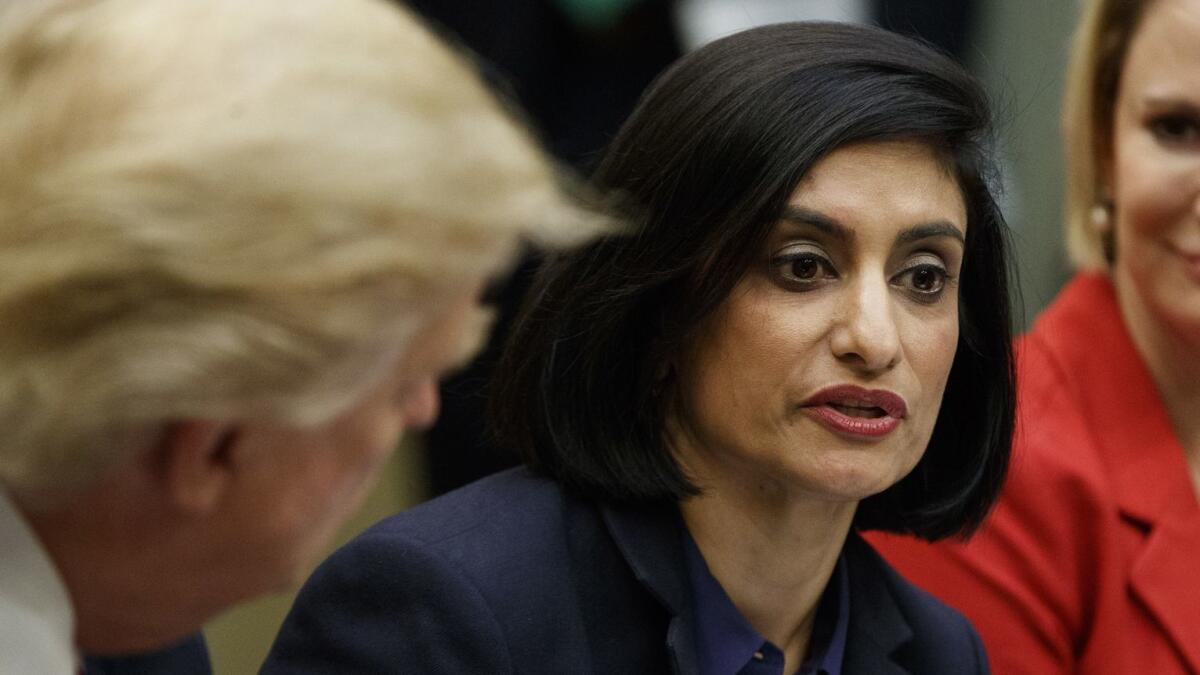Trump plan would reshape Medicaid with block grants

- Share via
WASHINGTON — Blocked on Capitol Hill from cutting and restructuring federal money for Medicaid, the Trump administration launched a new effort Thursday to develop ways to change how the half-century-old safety net program is funded.
The move, strongly condemned by advocates for the poor, will likely affect relatively few Americans who rely on Medicaid.
But the administration initiative may allow a handful of states to convert some of their federal Medicaid aid to a block grant in place of the current system, which automatically covers poor Americans who are eligible for coverage.
Medicaid, together with the related Children’s Health Insurance Program, now covers more than 70 million low-income Americans and costs some $600 billion annually. Those costs are split between the federal government and states. Each state has responsibility for operating its own Medicaid program.
Senior administration officials billed their new plan as an opportunity for states to experiment with new ways to design their safety nets that could save money.
Seema Verma, who oversees the Medicare and Medicaid programs at the U.S. Department of Health and Human Services, called it “a groundbreaking new policy that holds the potential to transform the Medicaid program.”
The proposal drew interest from Oklahoma, which has not expanded Medicaid coverage through the Affordable Care Act. However, the potential for large administrative hurdles, an uncertain legal landscape and the prospect that states could lose money seems likely to sharply limit the interest of many other states.
The administration’s proposal doesn’t appear to affect states such as California that wish to maintain current Medicaid funding.
Nevertheless, the administration’s move was widely seen as another effort to cut healthcare assistance for poor patients, echoing the White House’s 2017 push to roll back coverage expansions made possible by the Affordable Care Act and its more recent support for a lawsuit seeking to eliminate the 2010 law.
“As patient and consumer organizations representing millions of individuals facing serious, acute and chronic health conditions, we are deeply concerned about guidance released today,” a coalition of groups said Thursday. The coalition included the American Heart Assn., the American Lung Assn., the Cystic Fibrosis Foundation, the March of Dimes, the National Alliance on Mental Illness and the advocacy arm of the American Cancer Society.
In a call with reporters, Verma defended the block grant plan, noting states would be allowed to experiment only with funding and coverage for low-income adults who became eligible for coverage through the Affordable Care Act. Among the potential changes could be work requirements, premiums and co-pays for enrollees and limits on which prescription drugs Medicaid will cover.
States will not be allowed to alter Medicaid coverage for poor children, pregnant women, seniors or disabled Americans, Verma said.
However, states that apply for the block grant funding could potentially limit benefits or eligibility for health coverage for low-income adults, according to guidance issued Thursday by the administration.
Such changes are almost certain to be challenged in court. Critics say such a substantial change in federal spending requires congressional authorization.
Federal courts already rejected a previous attempt by the Trump administration to make a substantial change to Medicaid without congressional approval, overturning the administration’s approval of state requests to impose work requirements on people enrolled in Medicaid.
Republicans have long wanted to convert federal Medicaid funding into block grants to states, arguing this would help rein in federal healthcare spending.
Since its inception, Medicaid has been an entitlement. That means that any American who meets the eligibility standards is entitled to health coverage.
Eligibility standards have typically varied from state to state, but have generally expanded over the years, most recently when the 2010 healthcare law made hundreds of billions of dollars of additional federal assistance available to states to expand Medicaid to cover poor adults, a population that had been largely excluded.
That aid helped drive a historic drop in the nation’s uninsured rate. At least 20 million previously uninsured Americans have gained coverage since 2014, data from multiple surveys indicate. The surveys suggest the coverage gains have slowed or even reversed since Trump took office.
Medicaid expansion has rankled Republicans, who continue to resist expansion in many states. The most recent GOP effort to shift Medicaid to block grants failed in 2017 when the party’s drive to roll back the 2010 healthcare law collapsed.
More to Read
Get the L.A. Times Politics newsletter
Deeply reported insights into legislation, politics and policy from Sacramento, Washington and beyond. In your inbox three times per week.
You may occasionally receive promotional content from the Los Angeles Times.











